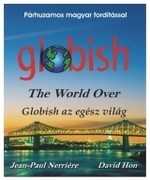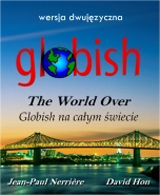Remodeling The Tower Of Babel For The 21st CenturyPublished on 06 December 2011 Comments (Be the first)by Susan Easton(OfficialWire)SAN FRANCISCO, CALIFORNIA (USA)OfficialWire News Bureau Susan Easton"I'd Like to Teach the World to Sing (In Perfect Harmony)” debuted in a worldwide 1971 television commercial for Coca-Cola. Also known as “the Hilltop Song,” the commercial featured an assembly of multicultural teenagers walking up to the crest at the top of a hill, earnestly raising their voices to say how they would also like to buy the world a Coke. The jingle was so successful that the lyrics to the song were rewritten (minus the Coke ad). The ”de-commercialized” version of I’d Like to Teach the World was then recorded by The New Seekers, a very upbeat, American evangelical sort of group, and the song instantly became a number one hit.Teaching the world to sing let alone work together in harmony is a persistent utopian vision which has met, especially in the past few centuries, with marginal success. Utopian communities – many based on religious principles of one sort or another - have been so numerous that they rate their own lengthy Wikipedia entry. Then there are the obvious experiments like theUnited Nations which, like its predecessor the League of Nations, was designed to prevent future wars, and the European Union which is being reinvented (again) this very week. Apart from religious or cultural practices, there has been until recently only one utopian ideal which involved building a universal language. That was Esperanto, a “nation-free” tongue created in 1877 by Ludwig Lazarus Zamenhof. Zamenhof was born in Bialystok, once part of the Russian Empire, now a part of modern Poland. His Father spoke Russian, as did his Mother. She also spoke Yiddish. Yiddish derives from a blend of High German dialects, Hebrew, Aramaic, Slavic and a smattering of other romance languages. The creation of Yiddish is credited to the Ashkenazi Jews. Written Yiddish uses the Hebrew alphabet. Zamenhof’s Father taught German. The family learned and spoke Polish. Zamenhof also acquired fluencies in French, Latin, Greek, Hebrew and English. He dabbled in Italian, Lithuanian andSpanish. He was a self contained embodiment of the Tower of Babel.Zamenhof chose the name Esperanto for his new language: it translates as “one who hopes.” His goal was simple and yet incredibly complex. He wanted to teach the world to speak in a politically neutral language not tied to any nation. His utopian dream was that Esperanto would bring peace and international understanding as soon as enough people learned how to speak it well enough to sit down and broker the end to wars. Esperanto was not meant to function, therefore, as a means of conducting commercial enterprises. It was meant to promote peace on earth.What Zamenhof could not have seen coming is the 21st century’s state of globalization around the world, fueled by international trade, jet transportation, the internet and its quirky features known as emailing and texting.Nor could the founder of Esperanto - which still has devoted followers here and there - foresee that the economic powerhouse the United States has become, would eventually abandon teaching its children at least one living foreign language, much less an invented one. In his own experience, the borders of countries frequently moved and languages changed along with them. Learning to speak many languages was required. An estimated 6,700 recognized languages are spoken around the world today, although many are used by fewer than a thousand people. Currently over 45 countries recognize English as an official language, if not their native tongue. One out of five people can speak English, although fluency varies a great deal. But in this globalized world, despite the perceived dominance of English as the lingua franca, it is estimated that less than 10 percent of face-to-face or telecoms-based business transactions are conducted between participants who both use English as their principal language.The statistics on emailing and messaging are even more fascinating barometers of the way business is conducted in the 21st century. A recent global communications technology study reports that North Americans and Europeans are much more likely to use email as their primary form of communication. In the Asia-Pacific (APAC) region, instant messaging is more popular. Cell phone texting and Twitter are limited to 160 characters per message. As a result a shorthand language of emoticons has sprung up. Epsilon’s Global Consumer Email Study found that respondents in 13 key countries use various communication tools based on their country of origin. What the world needed was a new utopian language designed to facilitate and encourage successful business transactions using a short universally understood vocabulary: Enter GLOBISH.Created in 2004, ago by Frenchman Jean-Paul Nerrière, Globish uses a subset of Standard English grammar, and a list of 1500 English words using a subset of established rules. It is the opposite of Babel. The goal of Globish is to create a new linguistic foundation for getting the job done in international business. Its unique advantage, unlike Esperanto, is that it is not an invented vocabulary. The underlying principle was to create a level playing field for non-primary English speakers to facilitate communicating with primary English speakers. It’s like playing soccer with people from other countries where you might not speak the language fluently, but you all know the same basic words and the rules of the game.To make Globish a reality Nerrière faced a significant challenge. For a start, there are over 260,000 words in the English language. Nerrière had to whittle these down to just 1500. (Note: ‘whittle’ is not one of them). For more information, take a look at the free introduction to Globish, hosted on the net by Jean-Paul Nerrière himself. The complete list of the 1500 word Globish lexicon and information on courses and conference is available at www.globish.com. Or for a more scholarly venture into the world of “speaking in tongues,” purchase a copy of Globish: How the English Language Became the World’s Language.The book’s author, Robert McCrum, is an Associate Editor of The (UK) Observer and collaborated with Robert MacNeil, retired co-founder and host of the MacNeil Lehrer Report (PBS), on the televised version of MacNeil’s book, “The Story of English.” Teaching the world to speak in any kind of harmony would strike a thinking person as a capital idea, especially in the global village which we all now inhabit. Globish was not invented to make native English speakers feel superior to others, but to communicate with others more graciously and efficiently.It’s close to Christmas, the time when we are supposed to encourage Peace on Earth to men (and women) of good will. Communicating with others in the spirit of harmony – and getting the job done - might be something brilliant enough to set atop the tree as opposed to under it in a box.Think Globish. ContactOfficialWireSusan EastonTel: +1 6235517365 MEDIA CONTACT

Rubriques disponibles
Winners speak Globish
An ebook by Elisabeth Noble
Une Anglophone de naissance consacre un livre au "Globish", facile à lire, bien documenté, plein d'anecdotes et d'observations inédites.
A commander sur www.smashwords.com
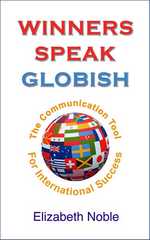
A native English speaker wrote a book about "Globish". It is full of anecdotes, easy to read even for non Native English speakers, and it gives a fair and balanced representation of the Globish concept.
Order at www.smashwords.com
Visiteurs
 31,5%
fr-FR
31,5%
fr-FR
 18,1%
United States
18,1%
United States
 6,1%
Canada
6,1%
Canada
 5,9%
Germany
5,9%
Germany
 5,3%
Singapore
5,3%
Singapore
Total: 123 Pays |
2829731
|
|
Translations of Globish The World Over
Globish IN Globish - (GNG)
Globish IN Globish est un cours en auto-apprentissage facile à utiliser tout autant sur un ordinateur que sur n’importe quel téléphone portable muni d’une connexion à Internet. Pour l’utiliser, il vous faut être capable de lire et comprendre les 35 mots les plus communs en anglais, et donc repris en globish (les tests ont montré que ceux qui avaient quitté l’école le plus tôt possible maîtrisaient 850 mots d’anglais, ne serait-ce que parce que nous les utilisons dans le quotidien du français). Dès que vous pensez en dominer plus que 350, vous pouvez débuter au niveau que choisirez, en rapport avec votre capacité.
Les deux premières leçons vous sont offertes gratuitement sur tout ordinateur muni d’un accès à internet.
En travaillant exclusivement en globish, vous pouvez rapidement apprendre la grammaire, et des mots nouveaux, avec leur prononciation, dans le cadre d’une histoire contextuelle. L’apprenant qui arrive au terme de Globish IN Globish devrait se trouver parfaitement à l’aise du niveaux B1-B2 attribués par le « Common European Framework of Reference for Languages » (CEFR).

Globish IN Globish is an extensive self-study course in Globish that is easy to use on either any standard computer with Internet capability. To use it you must be able to read the most-common 350 words in Globish/English. Then you can begin at any point that matches your ability. Try the first two lessons now, for free, on either your mobile phone or on a computer that has Internet.
By working only in Globish, you can quickly learn both grammar, and new words with pronunciation, in a story context. The student who completes Globish IN Globish should be quite capable at B1-B2 (English) levels given by the Common European Framework of Reference for Languages (CEFR).
Not Quite Shakespeare - (NQS)
Not quite Shakespeare (« pas tout à fait du Shakespeare ») est une collection de 9 courtes pièces de théâtre, rédigées entièrement en Globish, avec le vocabulaire original des 1500 mots recommandés. Elle est destinée aux enseignants qui souhaitent mobiliser des classes sur la conversation. NQS donne aux étudiants des rôles à jouer, et les amène dans des domaines d’expression dépassant largement « je vais chez le boulanger acheter le pain ». Ces documents fonctionnent très bien pour la prononciation, d’autant plus que l’apprenant est ici traité comme un acteur, et non plus que comme un étudiant.
Cliquez ici pour une démonstration gratuite, Auditions for God, sous forme de publication électronique dont vous est laissée toute liberté d’usage. « Auditions For God » se joue avec quatre personnages, et ne nécessite rien de plus qu’un pièce pour lire et jouer la pièce. Comme il convenait dans les pratiques du Moyen-Âge, le rôle de Dieu est le mieux rémunéré, et de nombreux acteurs se présentent en audition pour le rôle. Finalement Dieu se porte candidat en personne (et n’est pas vraiment très bon..)
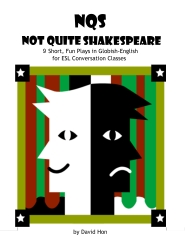
Not Quite Shakespeare is a collection of 9 short, proven plays in 1500 Globish words, for teachers who want to involve their large English-Conversation classes. NQS gives students proven real plays whose subject matter goes far beyond the usual role plays like "going to the store and buying bread". It also works very well for pronunciation tutoring, as the student is treated as an actor with a performance to give, rather than as a student.
Click here to try a free play, Auditions for God, in e-book form, which you may copy and use as you wish. “Auditions For God” is for four characters and needs nothing but a room to read or perform. Based on actual medieval practices, the role of God receives the highest pay, so many actors come to audition for the role. Finally, God himself auditions. (He's not very good.)
President Obama’s Inauguration Speech.
Vous trouverez ci joint la transcription en Globish du discours d'investiture du Président Barak Obama.
Cette transcription est faite en parallèle du texte originel
Bonne lecture

You will find here the speech given by President Obama for his inauguration January 20th, and also its transcription in Globish. The latter would be readily understood by a much larger number of non Anglophone like foreign citizens and immigrants. We hope you enjoy the reading.
Éditions internationales

 Les deux éditions
Les deux éditions
parues en Corée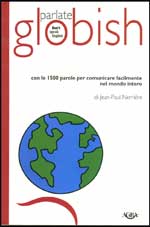 Parution en Italie
Parution en Italie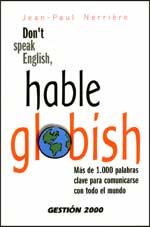 Parution en Espagne
Parution en Espagne
 Les deux éditions
Les deux éditions
parues en chine.

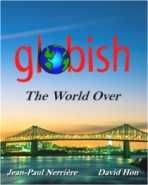 Globish
Globish Japanese
Japanese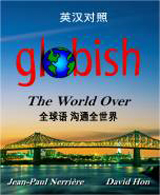 Chinese
Chinese Spanish
Spanish